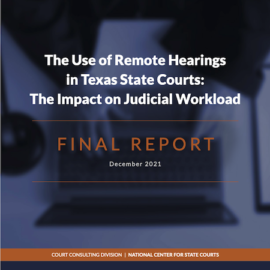The first national review of data that confirms what judges have anecdotally shared about remote hearings before and during the pandemic. The 12-month study analyzed both 1.25 million minutes of judicial data and focus group feedback from judges and court leaders in eight counties across Texas. The National Center for State Courts (NSCS) study, supported with funding from the State Justice Institute, found that remote proceedings take about a third longer than in-person hearings largely due to technology-related issues and lack of preparation by participants. But the study also found that remote proceedings take longer because they increase access to justice, as litigants can more easily attend and participate in hearings. To read NCSC’s full report
New Resources for Dependency Fact Finding and TPR Trials
As courtrooms are starting to open up more, and many courts are using a hybrid model allowing some participation remotely, the attached sample documents may be a good resource in preparing for Fact Finding and Termination of Parental Rights trials. The Child Welfare Committee of the Board of Judicial Administration Court Recovery Task Force created three sample documents (see attached), which have been endorsed by the Task Force: SAMPLE Pre-Trial Order for Remote Dependency Fact Finding or TPR Trials….
New DCYF Family Time Guidance for Making Temporary, COVID-Related Changes to Court-Ordered Visits
DCYF and court partners worked with DOH to develop new in-person Family Time guidance that directs parties in every case to work together to reduce the opportunity for viral transmission during visits by creating Temporary COVID Aware Family Time Plans. The guidance does not eliminate in-person Family Time, due to the vital importance of keeping families connected during the pandemic. If parties cannot agree on a temporary plan, the issue will be brought to court.
Children’s Bureau Letter re: Continuation of Critical Court Hearings, Family Time and Services – December 4, 2020
In a December 4, 2020, Letter to the Field – Ensuring the Continuation of Critical Court Hearings, the federal Children’s Bureau urges courts and child welfare agencies to continue working together to ensure that access to justice continues and that critical judicial oversight occur in child welfare proceedings during these difficult times.
Incarcerated Parents’ Access to Virtual Dependency Hearings
The Department of Corrections is now providing mandatory virtual participation in child-dependency court hearings for incarcerated parents to ensure access when in-person participation is unsafe due to the pandemic. Current policy and procedures are provided in a DOC memo.
Making Reasonable Efforts Findings in a Pandemic – NCJFCJ Webinar
WEBINAR The National Council of Juvenile and Family Court Judges (NCJFCJ) hosted a webinar on Making Reasonable Efforts Findings in a Pandemic. Taught by NCJFCJ Past President Judge R. Michael Key, the webinar and related materials help juvenile and family court participants understand the importance of examining reasonable efforts during the current COVID-19 pandemic.
Supreme Court Extended and Revised Order Re: Dependency and Termination Cases
On October 14, 2020, the Supreme Court of Washington issued a Revised Emergency Order on Dependency and Termination Cases, modifying certain provisions of its April 30th order to better guide court operations going forward in the COVID-19 pandemic.
WA Guidance Resuming Dependency Fact Finding and Termination Hearings – July 10, 2020
Guidance on Resuming Dependency Fact Finding and Termination of Parental Rights, issued by the Washington Supreme Court in July 2020. At the request of Chief Justice Debra Stephens, a workgroup was formed by Justice Barbara Madsen, Co-Chair of the Commission on Children in Foster Care, to develop model guidelines and best practices for resuming dependency fact finding and termination of parental rights trials following the March 2020 suspension of all trials due to the COVID-19 pandemic. The guidance was created
Key Considerations for Virtual Hearings
This brief from Casey Family Programs summarizes key considerations — potential benefits and potential concerns — for courts utilizing virtual hearings. The pandemic has provided a rare opportunity to rapidly redesign the court process, and virtual hearings will likely continue, in some fashion, post-COVID-19.
Federal Children’s Bureau Guidance on Termination of Parental Rights During COVID-19
The Children’s Bureau letter to state and tribal child welfare leaders addressing concerns related to filing a petition to terminate parental rights when services have not been available





